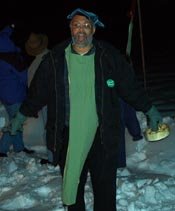"I asked myself: What can I do to end this war if I'm willing to go to prison for it?"
I heard that statement this afternoon. But unfortunately it came from an old man remembering something he did a long time ago. In fact I was listening to three old men: Daniel Ellsberg, Mike Gravel, and Robert West. Thirty-five years ago they came together to publish The Pentagon Papers and puncture the public's illusions about the Vietnam War.
To understand what The Pentagon Papers were, imagine that Donald Rumsfeld had the true and secret history of the Iraq War locked in safe somewhere. Imagine what would happen if somebody opened that safe.
Well, replace Rumsfeld with McNamara and Iraq with Vietnam, and you pretty much have it. Daniel Ellsberg was a Rand Corporation analyst who had the clearances necessary to see the Papers. He funneled them to Gravel, a senator from Alaska, who made them virtually unsuppressible by reading them into the Congressional Record. And West ran Beacon Press, the 36th publisher that Ellsberg and Gravel went to, the one that said yes.
I heard them tell their story today at the General Assembly of Unitarian Universalists, the annual national meeting of my faith. We UUs have a certain amount to crow about in this story: Beacon is our house press and Gravel is a UU.
In a day or two you should be able to watch the video here:
http://uua.org/events/generalassembly/2007/27648.shtml
You should. It's a great story, full of cloak and dagger: Ellsberg handing off the Papers to an associate at a Cambridge motel, and watching on the motel TV as the FBI raided his home. The associate doing a midnight transfer of boxes of documents from his trunk to Gravel's out in front of the Mayflower Hotel in D.C. Gravel, a dyslexic, needing his staff to help him read the 7,000 pages so that he would know what he had. All Gravel told each staffer was to pack a bag and come over to his house. At the door he met them individually and said "I have the Pentagon Papers. You can go home now, but if you come in you're staying until I leave for the Senate."
They all came in.
Imagine that. One congressional staffer after another willing to face going to jail -- not for money and not to cover up some other wrong-doing, but to end a war.
Seventeen different newspapers published portions of The Pentagon Papers in what Ellsberg called "institutional civil disobedience".
Imagine that.
Beacon Press agreed to publish the Papers in book form only after their usual law firm washed its hands and left. There was a real chance that West might go to jail, or that Beacon or even the UUA might be ruined.
They published.
Where does courage like that come from? Ellsberg says it's contagious. That was his exact word. He says he caught his courage by talking to draft resistors, the ones who decided to go to prison rather than to Vietnam. Gravel says he caught it from Ellsberg. And Gravel's staff must have caught it from him.
But that outbreak has been under control for years now. They must have come up with a vaccine or something, because I haven't seen a whole lot of courage lately.
Hundreds of people, Ellsberg speculates, have documents in their safes that could do for Iraq what The Pentagon Papers did for Vietnam. Hundreds more, he thinks, have documents that could derail the onrushing war with Iran.
If one of those people would decide that he's willing to go to prison.
Prison? These days I'd be happy just to see somebody who was willing to lose an election if necessary. Or just bear up while Dick Cheney scowled and Rush and Sean and their ilk said nasty things. Somebody who was willing to be ridiculed if that's what it took to end a war.
That's what Ellsberg saw in Gravel, and why he was willing to risk giving him the Papers. "Here was a senator who was not afraid to look foolish," he said today. "That's the fear that keeps us in line."
Ellsberg, we know in hindsight, didn't go to prison. The Nixon administration used such outrageous tactics against him that the case was thrown out of court. Gravel and West didn't go to prison. Beacon thrived. But nobody knew that was how it would come out.
So what does Ellsberg recommend to those hundreds of people who have the goods on our wars and potential wars? Don't wait. He thinks that if he'd done in 1963 what he did in 1969-72, the Vietnam War might never have become the fiasco it turned into. An informed public might not have stood for it. "Don't wait until the bombs are falling," he said this afternoon.
But he's an old man now. What does he know? Things were different in his day.
Doug Muder
22 June 2007
As always, I appreciate anything that gets me more readers. Feel free to forward this text or reproduce it in any other non-commercial way.
Subscribe to:
Post Comments (Atom)


No comments:
Post a Comment